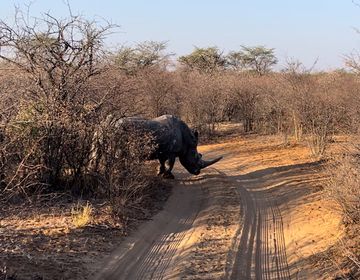Dijo Di Monate
Dijo di monate (translated to “the food is nice”), is a commonly practiced phrase among some members in our group to describe the cuisine.
The type of cuisine in a country is extremely integral to the experience students have during their program. Here in Botswana, students have had the opportunity to not only eat a variety of typical dishes, but they have learned more about the culture and history around the food that they are eating. Most meals on this program are buffet style and students share these meals all together as one group, providing an opportunity for wholesome conversations, reflection, connection and learning.
A typical meal includes a protein, a starch, and a vegetable. The specific foods in these categories are largely determined by political influences, the economic environment, culture, geography, and available resources of the country. Across the nation, there is seasonal rainfall and more inconsistent rainfall over the past few years due to climate change. Therefore, food products that require more water consumption to produce are less common within the traditional diet (for example less cheese and dairy products). In more recent years, the availability of certain foods has shifted due to Botswana's President Mokgweetsi Masisi’s initiatives to reduce food and produce imports from South Africa. This has mainly affected fresh produce such as tomatoes, onions, and potatoes, and has affected the availability of certain goods while in-country production is still increasing.
As students have learned, beef is the most common meat in meals, followed by goat and chicken (and more fish in the northern part of the country). During their homestay visits, students also learned about the commonality of families within the city of Gaborone having cattle posts and farms within villages outside of the city. Some students even had the opportunity to visit these farms and then take part in the preparation of their meals. Here at Mokolodi, students were able to help prepare their lunch for the day; they worked together on the salad, potatoes, beets, beef, chicken, bread, and fat cakes.
A tradition meal with goat, beef, mixed vegetables, pap, two types of sorghum, and chakalaka:
A common breakfast at Mokolodi includes cereal, yogurt, eggs, toast, beans, tomatoes, sausage or bacon, juice, and coffee or tea:
A common lunch or dinner at Mokolodi includes a meat (beef or chicken), vegetables or salad, beans, and a starch (potatoes or pap):
A common snack break at Mokolodi includes tea, coffee, hot chocolate, or juice and either light sandwiches or cookies/biscuits:
Related Posts
Final Reflections and Advice for Future Students
It is our last day here in Botswana and before all the tears began, we asked students to share some of their final reflections and thoughts. Over the past three... keep reading
A Baobab that rose from the Okavango Delta
There are some things that are iconic to the continent of Africa- the big five, delicious food and the majestic Baobab tree. The Baobab is known as the tree of... keep reading
Khama Rhino Sanctuary
The first stop on our journey to the northern part of Botswana was the Khama Rhino Sanctuary; established in 1992, the sanctuary is a “community based wildlife project” aimed at... keep reading

